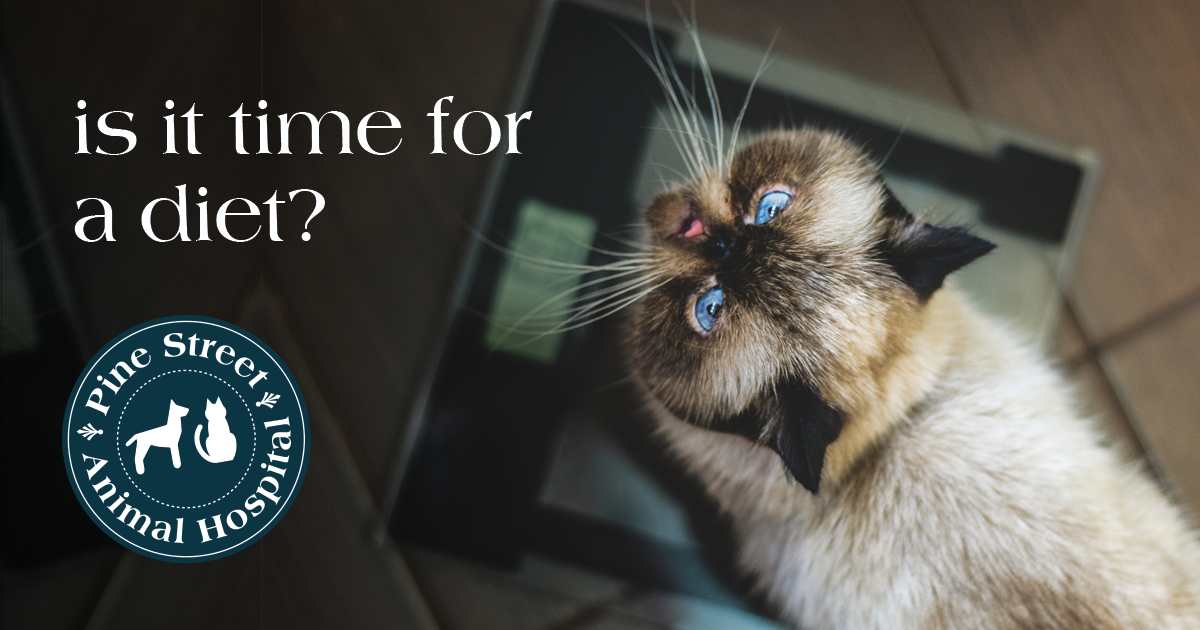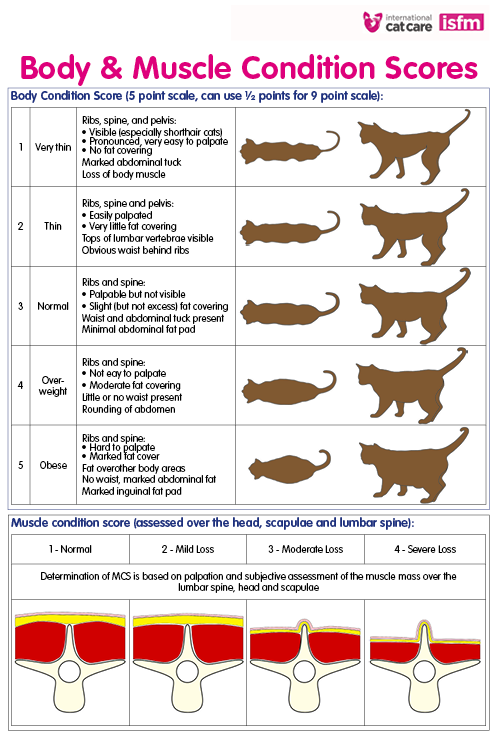Help your cat to lose weight
How to help your cat lose weight

Your cat’s rotund belly and expansive way of sprawling across the couch cushions may seem adorable, but it’s important for you as a cat owner to realize that fat cats are usually not healthy cats. There are some key steps you can take to help your overweight cat eat better and exercise more in order to have a longer, healthier life.
Is my cat overweight?
Fifty-nine percent of American cats are overweight or obese, so odds are your cat may be among the oversized. How can you tell if your cat weighs too much? All cases are different based on your cat’s breed and frame, but in general, housecats should weigh 8-10 lbs. Smaller breeds, like Siamese, may be closer to 7 pounds, while large Maine Coons can still be healthy at 20-25 lbs.
One way to tell is to look at your cat from above. Their shape should be hourglass – thinner in the middle – and you should be able to feel their ribs easily. From the side, you shouldn’t see a belly hanging down.
If you’re not sure about your cat’s healthy weight, ask your veterinarian.
Why does weight matter?
While your cat’s large girth might look cute and sassy, it can actually be causing severe health problems. Obesity in cats can lead to Type 2 diabetes, heart disease, arthritis, respiratory problems, skin problems (often from trouble self-grooming), and reduced life expectancy. Don’t ignore signs if your cat begins to gain weight or carries around excess weight. It’s up to you to help your cat lose the weight to become healthier.
Food matters.
The first way to help your cat lose weight is to regulate food. These tips can help you feed your cat in ways to encourage health and discourage obesity:
- Do not give excessive treats or human food to cats.
- Consider giving canned wet food, which is higher in protein (see our blog about giving canned food to cats to learn more about this relatively new advice).
- Try making your cat work for food by using puzzle bowls or hiding food in safe containers.
- If you have more than one cat, separate them at feeding time to ensure that one cat isn’t eating the other’s food.
- Try using set feeding times instead of letting cats graze all day.
Get your cat to exercise more.
Just like with humans, its best to have a weight-loss plan that includes diet and exercise. So how can you get your cats to exercise more and be less lazy? First, make their home a place they want to play. Put in a cat tower to encourage climbing and healthy scratching. Provide lots of toys. And most importantly, play with your cats (yes, you!). Try using laser pointers, wand toys, or toys on strings to interact with your cat and encourage bonding and play. You’ll both enjoy the results!
Be patient but persistent.
Always remember that weight loss in pets takes a long time. Don’t expect to see immediate results. If your cat is severely obese, your vet may recommend a special diet with prescription food, and will monitor your cat’s progress. But for all other cases, making a few changes to diet and exercise can greatly improve the health of your cat, so keep up the efforts, even if it takes a long time for you to notice changes in size.
Dr. Adcock and Dr. Gorney are happy to discuss the best types of food for your cat, and whether or not he or she needs a special diet or exercise plan. Contact us today for an appointment.
Help my cat is overweight! Our best tips to help your fat cat to lose weight.
Between 39 to 52% of cats are estimated to be either overweight or obese. Many studies have shown that a fat cat will be more likely to have a shorter lifespan. So how do we tell if our cats are overweight and if they are how do we tackle the issue? Is there a weight watchers for cats?
Is my cat overweight?
Body weight is commonly used in clinic to assess if your pet has gained or lost weight. However as in humans, two people may weight the same but one may have more body fat than the other. This will depend on height and build. Similarly in cats the ideal body weight is individual and depends upon the age and breed of your cat.
Measuring body condition score is a much better way to assess obesity in our pets. The body condition score is a scale from 1 to 5, where 1 is very thin and 5 is obese. The chart below can be used to assess your own pet.

Why should my fat cat lose weight?
Obesity in cats can increase the risk of developing or worsening many diseases such as:
- Diabetes mellitus
- Lower urinary tract disease (i.e. cystitis)
- Arthritis and joint inflammation and pain
- Skin diseases
- Hepatic lipidosis (too much fat in the liver)
- Breathing problems
As well as this it can lead to a reduced quality of life and increase the risk during anaesthesia.
How do I help my fat cat lose weight?
Firstly cats must not lose weight too quickly because this may predispose them to developing hepatic lipidosis, a problem with too much fat in the liver. This condition affects their liver function and potentially can be fatal. In cats we aim for a steady and gradual weight decrease. In obese cases this may mean a weight loss plan to reach their goal weight in over 1 year.
Start by measuring out the food you feed you cat daily and feeding your cat the amount of food for the weight it should be. Most foods will give you amounts on the packet. Most cats should aim to be around 4kg. If you are unsure then come in for a check up and we can help you with this. If that alone does not lead to a weight loss then drop the food level down by another 10%. Remember to give it time as we are aiming for a gradual decrease in weight. Special diet foods can be helpful as they maybe more filling and satiating.
One of the main problems we see with overweight cats is in multi-cat households where they often eat the other cats or even the dogs food. There are a few ways to tackle this one is to feed the cats in separate rooms and taking the food up between meals. However many cats are grazers and this may not be suitable. Another way is to purchase a microchip cat feeder such as the one in the video below, a Surefeed cat feeder. They work by opening just for the cat or cats registered to that feeder so only they can get the food. Sometimes you only need a feeder for the cats not on a diet!
Comments
Post a Comment